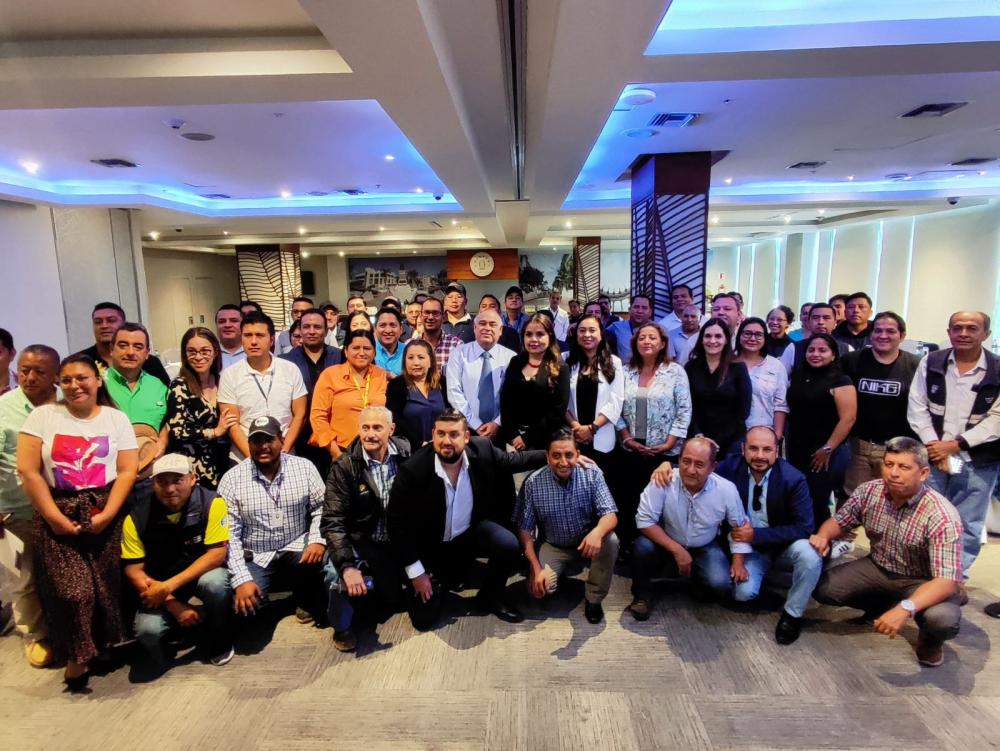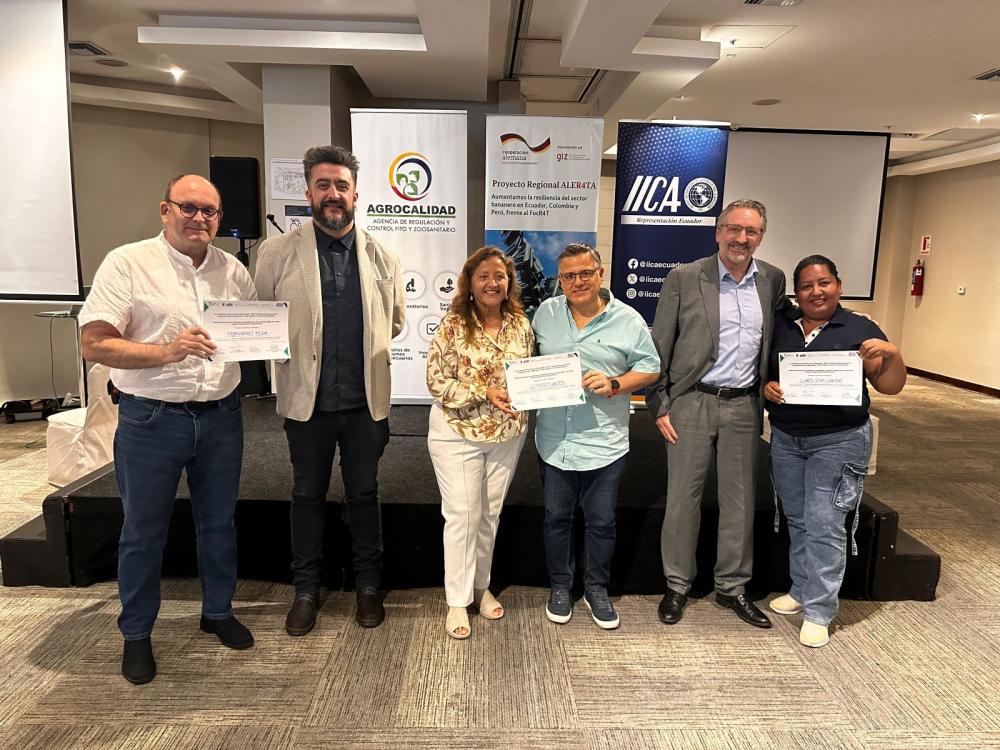Funded by GIZ and implemented by IICA in Bolivia, Colombia, Ecuador and Peru, the ALER4TA project seeks to enhance the response capacity of countries to the threat of Fusarium Tropical Race 4 (Foc TR4).

Guayaquil, Ecuador, 5 July 2024 (IICA) – More than 80 producers in Ecuador were trained in the prevention, detection, and control of pests that threaten the agricultural chains of bananas and plantains, which are fundamental for food security and socio-economic development in this country and throughout Latin America and the Caribbean (LAC).
The training, which will enable producers to redouble efforts by implementing biosecurity measures that ensure the phytosanitary status of these chains, took place within the context of a hybrid event organized by the Inter-American Institute for Cooperation on Agriculture (IICA) and the German Agency for International Cooperation (GIZ), with support from the Ministry of Agriculture and Livestock (MAG) of Ecuador, the National Agricultural Research Institute (INIAP), and the Agency for Phytosanitary and Zoosanitary Regulation and Control (AGROCALIDAD).
The training was part of the ALER4TA project, funded by GIZ and executed by IICA in Bolivia, Colombia, Ecuador, and Peru, which aims to strengthen the response capacity of the countries in the Andean region against the threat of Fusarium Tropical Race 4 (Foc TR4).
Foc TR4 is a highly destructive fungus that causes banana wilt disease. It is resistant to chemical treatments, and can remain in the soil for decades, making it a significant threat to global banana production.
The fungus can spread to new areas through the movement of infected planting materials or contaminated soil particles carried on shoes, clothing, agricultural tools, and vehicles, or contained in drainage and irrigation water.
Colombia and Peru are currently combating this pest, while there are no records of its presence in Bolivia and Ecuador.
Participants in the meeting learned about the importance of applying biosecurity measures for Foc TR4 and biological control agents such as Trichoderma sp., as well as ongoing research on new banana varieties tolerant to the pest and their benefits.

The identification of symptoms of the bacteria Ralstonia solanacearum Race 2, commonly known as “moko,” which attacks all varieties of bananas and plantains and is considered one of the most serious phytosanitary problems affecting Musaceae in tropical and subtropical regions of the world, was also reviewed. In the case of Ecuador, it is present in 15 provinces of the country.
“Only with the interaction of all institutions, along with the commitment of producers, can we move this forward. There is no better tool than experience and training, being attentive, receptive, and fully applying the acquired knowledge in biosecurity on our farms to protect crops,” mentioned the Deputy Secretary for Musaceae Strengthening of MAG, Gustavo Cepeda.
The general coordinator of plant health at AGROCALIDAD, Larry Rivera, highlighted that these learning meetings are crucial because they “allow us to stay at the forefront of technology, knowledge, and application of new protocols that need to be thoroughly updated in Ecuadorian territory and beyond our borders.”
Rivera added: “Ecuador will not cease to be the world’s largest exporter of bananas; we have markets where our bananas have practically 98-99% positioning, and we must maintain that. To do so, we need to strengthen biosecurity measures.”
Gladys Tazan, general manager of Jacaranda, a farm in Mozambique, Africa, who had to deal with Foc TR4, shared her experience and stated that “raising awareness, following regulations, attending training sessions and conferences, implementing measures, seeking alternatives, and testing pest-resistant varieties” is the way to prevent these diseases from jeopardizing banana production.
Danilo Vera, a researcher from the plant protection department at INIAP, shared how biological control agents help reduce colonization areas of this fungus in banana plantations, thus improving soil conditions to combat these diseases.
Renzo Galgani, IICA Representative in Ecuador, emphasized the importance of maintaining the sanitary conditions of farms since banana and plantain production generates many direct and indirect jobs in this country.

“Entire families depend on this activity, and if Ecuador were to lose part of these plantations, it would have a direct effect on the income of families, thereby increasing poverty levels,” he said.
Carlos Muentes, district technician and coordinator at AGROCALIDAD, expressed that prevention requires constant work. “We have become careless and neglectful with an enemy we still do not fully understand, like Fusarium and Moko; this is not time to let our guard down. Prevention through biosecurity measures is key.”
Marco Cacarín, analyst for the management and control of specific pests at the same agency, addressed the identification of “Moko” symptoms and outbreak management. He emphasized that Ecuador has a strong regulatory framework and rigorous protocols to guide responses to these outbreaks and that coordinated work among all actors in the chain is fundamental.
“Three out of ten bananas in international markets are from Ecuador; this shows the significance of this crop for food security and the country’s economy, highlighting the importance of comprehensive management and full compliance with established biosecurity protocols,” said Cacarín.
More information:
Lorena Medina, Agricultural Health and Food Safety specialist at IICA Ecuador.
lorena.medina@iica.int











